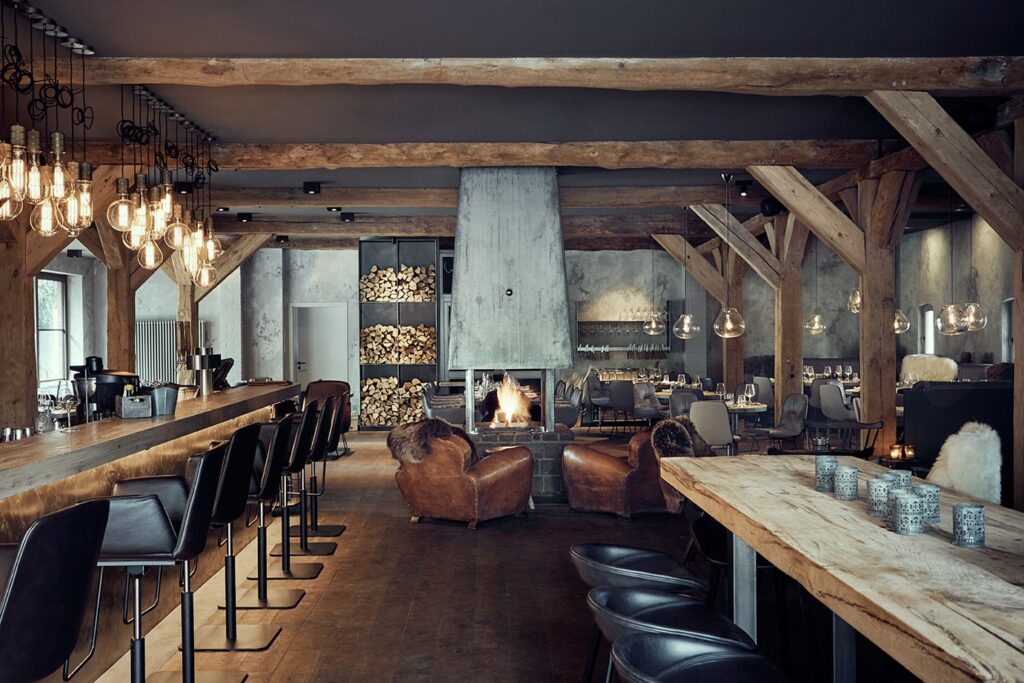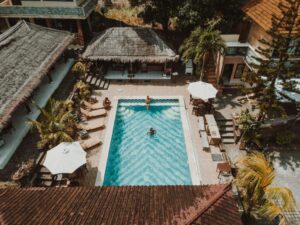When large teams come together and a platform for exchange develops within the company, you want to have thought of everything as a meeting planner. No unexpected surprises, but a location with a wow effect, a program that inspires the participants and a supporting program that is well received.
Based on our experience from numerous accompanied conferences and the scouting of over 400 locations for conferences throughout Europe, we share our knowledge on the subject of conference organization in this guide to conference planning. You will receive a template that makes it easy to plan the content of the conference and the supporting program and can choose from hundreds of locations for your next conference.

What is a conference?
A company conference is a key moment for sharing knowledge and strengthening the team. Unlike seminars or workshops, it offers space for a wide range of topics and promotes interaction between employees. By organizing a conference, the company creates a platform to deepen internal know-how, generate new ideas and set common goals. This is not just about gathering information, but also about strengthening the team and developing a shared vision.
What types of conferences are there?
Conferences
Large events that bring together experts, specialists and interested parties from a specific field to discuss current topics, present new research findings and offer networking opportunities.
Congresses
Similar to conferences, but often more specific to a particular industry or topic. Congresses can also include exhibitions or trade fairs to present products or services.
Symposia
Academic events aimed at bringing together a group of experts to discuss specific topics, present research findings and generate new ideas.
Seminars
Small to medium-sized events that focus on imparting knowledge on a specific topic. Seminars can be interactive and often include practical exercises or discussions.
Workshops
Practical events aimed at teaching specific skills or solving specific problems. Workshops can be interactive and allow participants to learn and develop new skills through practical exercises.
Which conference format is right for your event? Get clarity about the goals of the conference before you start organizing it.
Who takes part in a conference?
The big question after the invitation. Often, a clear group of participants will already be specified for the conference. But if this is not the case, check:
- Which guests must be invited so that binding decisions can be made?
- Which guests can contribute valuable content?
- Which guests should be invited due to their representative function?
- Which external guests could enrich the supporting program?
How can I plan a conference?
We have put together a to-do list for you that you can tick off step by step. If all the points are fulfilled, everything important is prepared.
- Definition of objectives and target group:
- Define the main objectives of the conference, e.g. knowledge transfer, networking or the presentation of new products.
- Identify the target group, e.g. experts, entrepreneurs or students or, in the case of internal conferences, the right employees
- Selection of the conference venue
- Look for a suitable venue in good time that meets the requirements of the conference, e.g. capacity, facilities and location. But also be creative in your choice. The oldschool conference hotels are out. You need fresh impetus and creative environments. meetreet helps you with this.
- Check availability and booking of the venue.
- Determination of the date and duration:
- Choose a date that is convenient for the target group and does not conflict with other events.
- Determine the duration of the meeting, whether it should last half a day, a whole day or several days.
- Program design
- Create a program with presentations, discussions, workshops and networking opportunities.
- Invite speakers to present their expertise and discuss relevant topics.
- Marketing and advertising
- Develop a marketing strategy to promote the conference. Emphasize the special added value of participation.
- Develop a strategy to reach the target group at the right moment (LinkedIn, internal channels, other events, etc.)
- Registration and participant management
- Set up an online registration system to register participants and accept payments if necessary.
- Manage participant information and communicate important details before the conference, e.g. program changes or directions.
- Logistics and organization on site
- Coordinate the logistics for the conference, including catering, technology and transportation.
- Ensure that all required materials and resources are available on site.
- Evaluation and feedback
- Collect feedback from participants after the conference to identify strengths and areas for improvement.
- Evaluation of the achievement of objectives and the effectiveness of the conference.

Where can I find a location for a conference?
Ask other companies, organizations or colleagues for recommendations for suitable conference venues. Personal experiences and recommendations can be particularly helpful when making a decision and, above all, you will discover real insider tips.
Of course, it also makes sense to use specialized websites and platforms that list a variety of venues for conferences. At meetreet , we have curated over 400 locations, all of which promote creativity and inspiration through their special design. You can find them all over Europe and the filter on conference hotels will quickly show you suitable conference locations.
If you would like to be accompanied in this process, there are event agencies that specialize in the implementation of conferences. At meetreet we are happy to advise you on the choice of location. Simply submit a location request.

Planning the content of a conference
We have put together an example of a rather unconventional agenda for a conference that includes ideas for activities as well as workshop formats and timings. Use them as inspiration for your own agenda, which should contribute to the defined goals of the conference.
Day 1
09:00 – 09:30: Welcome and icebreaker
- A relaxed start with a short icebreaker game to activate the participants and create a positive atmosphere.
09:30 – 11:00 am: TED-Style Talks
- Short, inspiring TED-style talks on various topics that stimulate the creativity and commitment of the participants.
11:00 – 11:30 a.m.: Coffee break with creativity stations
- Coffee break with interactive creativity stations where participants can record their thoughts and ideas.
11:30 – 13:00: Workshop Session 1: “Out-of-the-Box Thinking”
- Workshop to promote unconventional thinking and innovative ideas. The participants work in groups to find creative solutions to current challenges facing the company.
13:00 – 14:00: Lunch break with food trucks
- Casual lunch break with a variety of food trucks offering a selection of fresh and unusual dishes.
14:00 – 15:30: Escape Room Challenge
- Team-building activity in the form of an escape room challenge in which participants have to work together to solve tricky puzzles and escape from a room.
15:30 – 16:00: Creative break in the countryside
- Relaxed break in the countryside with opportunities for walks, frisbee games or simply to rest and exchange ideas.
16:00 – 17:30: Improvisational theater workshop
- Interactive workshop on the topic of improvisational theater that promotes the creativity, spontaneity and teamwork skills of the participants.
18:00: Dinner and live music performance
- Dinner together accompanied by a live music performance to end the day in a relaxed atmosphere.

Day 2
09:00 – 10:30: Yoga and meditation session
- Relaxing yoga and meditation session to promote clarity, concentration and well-being among participants.
10:30 – 11:00 am: Breakfast and brainstorming
- Informal breakfast with opportunity for informal exchange and spontaneous brainstorming sessions.
11:00 – 12:30: Outdoor Adventure Challenge
- Adrenaline-filled outdoor adventure challenge with various team challenges and activities that require courage, cooperation and determination.
12:30 – 13:30: Picnic in the countryside
- Picnic together in the countryside with a selection of delicious food and drinks.
13:30 – 15:00: Art and creative workshop
- Creative workshop where participants can discover and express their artistic skills, whether through painting, sculpture or other art forms.
15:00 – 15:30: Conclusion and reflection
- Joint reflection on the experiences and findings of the conference and outlook on the implementation of the ideas and insights gained.
This unconventional agenda combines traditional meeting elements with creative and experiential activities to create an inspiring and memorable meeting experience.

What mistakes can be made when planning a conference?
When planning a conference, there are a few pitfalls that can have a major impact on the participants’ experience. Especially important: Organization is not everything. It is important to recognize and take into account the individual needs of the guests.
Another mistake is choosing an outdated or unsuitable location. If the venue does not meet the needs of the participants or does not offer enough modern equipment, this quickly spoils the conference experience.
If the program is too one-sided or there is no opportunity to relax and interact, participants can quickly become bored and lose interest in the conference. Therefore, it is crucial to provide enough activities and break-ups during the conference to keep participants engaged and get the most out of the event.
Communication also plays a major role. We have learned that clear and open communication with all those involved – be it with the speakers, the participants or the staff on site – is essential to avoid misunderstandings and ensure that everything runs smoothly.
And last but not least – plan the budget very clearly so that there are no unpleasant surprises at the end.

Conclusion on conference planning
Planning a conference can be stressful. However, if you start on time, keep your guests’ interests in mind, choose a really suitable location and create a balanced program, the participants will be delighted.
We hope that this guide has helped you to organize your conference. If you would also like to organize a workation with the team, you can find another article here.









